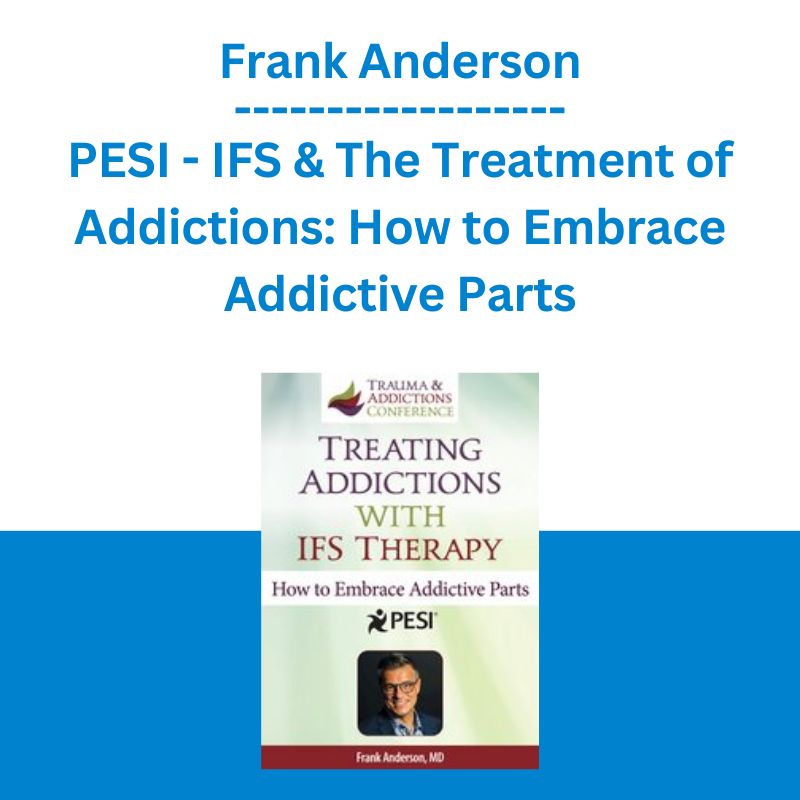*** Proof of Product ***
Exploring the Essential Features of “Frank Anderson – PESI – IFS & The Treatment of Addictions: How to Embrace Addictive Parts”
Speaker: Frank Anderson, MD
Duration:1 Hour 31 Minutes
Format: Audio and Video
Media Type: Digital Seminar
Description
Therapists regularly treat clients who struggle with some form of addiction, whether it be from substances, food, gambling, or sex. Unfortunately, the treatment can itself sometimes induce guilt and shame, especially when discussing the negative impact commonly associated with most addictive substances. In this session we’ll discuss IFS, a non-pathologizing treatment modality, helps clients “befriend” their addictive parts in a way that allows them to learn about their positive protective intention.
Speaker
Frank Anderson, MD
Frank Anderson, MD, completed his residency and was a clinical instructor in psychiatry at Harvard Medical School. He is both a psychiatrist and psychotherapist. He specializes in the treatment of trauma and dissociation and is passionate about teaching brain-based psychotherapy and integrating current neuroscience knowledge with the IFS model of therapy.
Dr. Anderson is a Lead Trainer at the IFS Institute with Richard Schwartz and maintains a long affiliation with, and trains for, Bessel van der Kolk’s Trauma Center. He serves as an advisor to the International Association of Trauma Professionals (IATP) and was the former chair and director of the Foundation for Self-Leadership.
Dr. Anderson has lectured extensively on the Neurobiology of PTSD and Dissociation and wrote the chapter “Who’s Taking What” Connecting Neuroscience, Psychopharmacology and Internal Family Systems for Trauma in Internal Family Systems Therapy – New Dimensions. He co-authored a chapter on What IFS Brings to Trauma Treatment in Innovations and Elaborations in Internal Family Systems Therapy, and recently co-authored Internal Family Systems Skills Training Manual.
His most recent book, entitled Transcending Trauma: Healing Complex PTSD with Internal Family Systems was released on May 19, 2021.
Dr. Anderson maintains a private practice in Concord, MA.
Speaker Disclosures:
Financial: Dr. Frank Anderson maintains a private practice. He is the executive director of the Foundation for Self Leadership and has employment relationships with The Trauma Center and The Center for Self Leadership. Dr. Anderson receives royalties as a published author. He receives a speaking honorarium, recording, and book royalties from PESI, Inc. He has no relevant financial relationships with ineligible organizations.
Non-financial: Dr. Frank Anderson is a member of the New England Society Studying Trauma and Dissociation and the International Society for the Study of Trauma and Dissociation.
Objectives
- Appraise the IFS model and how it applies to clients experiencing addictions.
- Identify at least 2 roles of emotions, pain & trauma within a person to help indicate reasons for common client reactions such as substance abuse, suicidal thoughts, obsessing, conflict avoidance, binging, cutting and more.
- Assess a client’s diagnosis and symptoms through IFS.
- Summarize the process of befriending addictive parts.
- Identify at least one intervention to deal with the conflicts (Polarizations) in relation to addictions.
Outline
- The critical first step before trying to stop an addiction
- How to offer an alternative solution apart from the addiction to overcome pain
- Exploring the traumatic wounds and how they develop into addictions
- How to address biology and habits in parallel to trauma recovery
Target Audience
- Addiction Counselors
- Counselors
- Marriage & Family Therapists
- Physicians
- Psychologists
- Social Workers
- Other Mental Health Professions
Please see the full list of alternative group-buy courses available here: https://lunacourse.com/shop/










 The Daily Traders – Exclusive Trading Mentorship Group
The Daily Traders – Exclusive Trading Mentorship Group